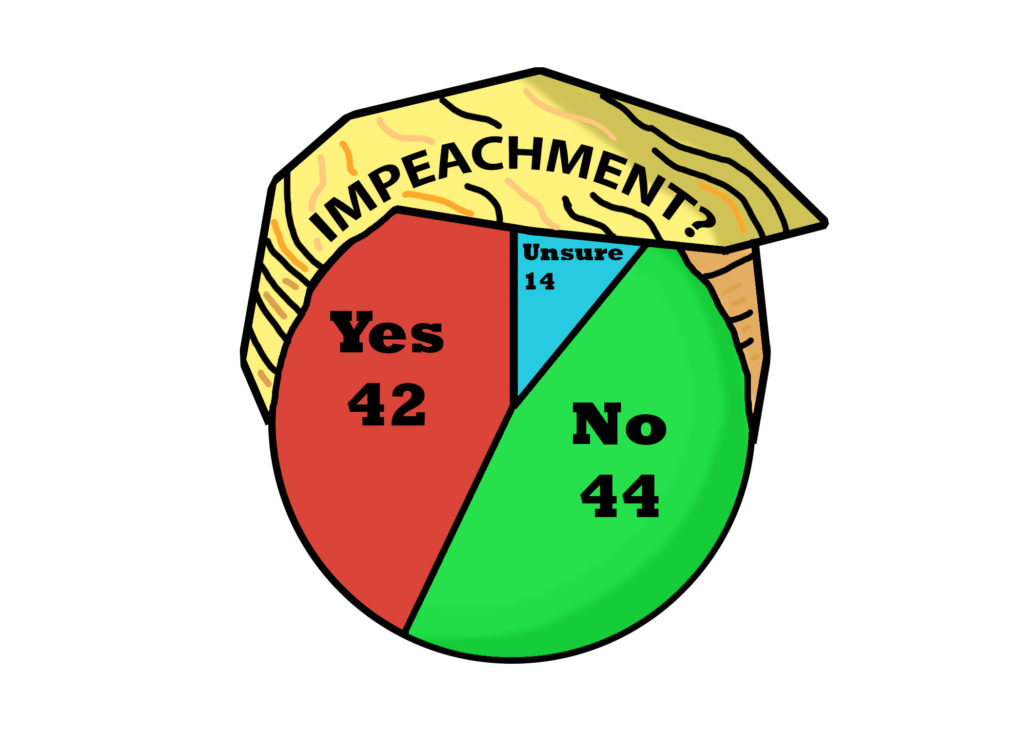On Tuesday the results of the third Grinnell College National Poll were released. This poll, gauging various opinions of 1,003 U.S. adults, helps to engage faculty and students in a wide range of important political discussions as well as to situate Grinnell College within larger national discussions of political issues.
Professor Peter Hanson, political science, is the director of the poll and cites educational and teaching opportunities for faculty and students and increased national attention as reasons the poll began in August 2018. According to Professor Hanson, faculty have the chance to contribute questions related to the research they are conducting. In the most recent poll, Hanson said four professors contributed questions. Professor Logan Lee, economics, Professor Karla Erickson, sociology, Professor Eliza Willis and Professor Doug Hess, political science, proposed questions ranging from mass incarceration to relationships with technology to confidence in voting and immigration.
For students, educational opportunities are presented in short courses as well as through the use of the data in personal and educational projects. This semester, Professor Hanson is teaching a short course titled “Political Polling: Analyzing the Grinnell College National Poll,” and next semester Professor Caleb Elfenbein, history, is teaching a short course titled “Questioning Grinnell Poll” to teach students about writing questions for the poll and potentially have them contribute questions to the next poll in April 2020.
The poll has already achieved plenty of national coverage. “I was really struck by the fact that our most recent poll, as soon as we released it, appeared in three different Washington Post stories, with writers talking about impeachment and citing our findings as part of their analysis,” Hanson said. He cites questions surrounding impeachment as one of the major findings regarding the political environment in America today.
In determining American’s views on impeachment, Hanson says they wanted to “break down impeachment into its component pieces.” To do this, “we asked—is it okay or not okay for a candidate for office to ask for assistance from a foreign government to help win an election. And here people are unanimous. Over 80 percent of Americans, that includes Democrats, Independents, Republicans, think that the underlying conduct was not okay.”
However, Hanson points out that, “From there, our respondents drew very different conclusions about what should happen as a result. Republicans—overwhelming numbers—said that this should not lead to impeachment proceedings in the House, the president should not be removed from office, and correspondingly, over 80 percent of democrats supported impeachment proceedings and said that the president should be removed from office.”
Though much national news coverage centers around the questions of impeachment, Hanson also cites the general prospect of Trump’s reelection as an important finding of the poll. “Only 38 percent of Americans say they’d definitely vote to reelect him as compared to 47 percent who say they definitely won’t,” Hanson said. “If you’re running for president and you’re already 10 points down, that’s a tough position to be in.”
Hanson also says this finding is surprising considering American’s opinions on the state of the economy. “A majority of people think the economy has improved since he took office, and an even stronger majority think their personal finances have improved since he took office. Now, normally there’s a pretty close correlation between economic growth and a president’s likelihood to win reelection, but President Trump’s really not benefitting from that, and I just think that’s because he’s got all these other troubles weighing down his presidency,” he said.
Hanson encourages students to look through the questionnaire on the Grinnell College website, saying, “If you’ve got the political bug, and you want to learn more about the political environment, what better way than to analyze the questions we’ve asked.”






















































